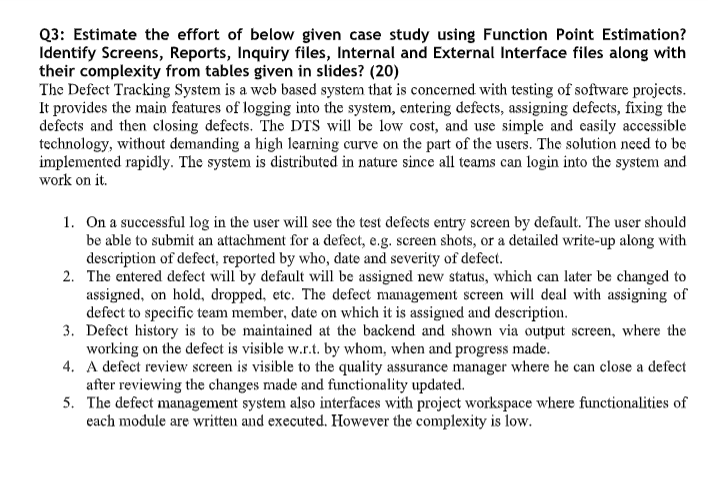 Estimate the effort of below given case study using Function Point Estimation? Identify Screens, Reports, Inquiry files, Internal and External Interface files along with their complexity from tables given in slides? The Defect Tracking System is a web based system that is concerned with testing of software projects. It provides the main features of logging into the system, entering defects, assigning defects, fixing the defects and then closing defects. The DTS will be low cost, and use simple and easily accessible technology, without demanding a high learning curve on the part of the users. The solution need to be implemented rapidly. The system is distributed in nature since all teams can login into the system and work on it. 1. On a successful log in the user will see the test defects entry screen by default. The user should be able to submit an attachment for a defect, e.g. screen shots, or a detailed write-up along with description of defect, reported by who, date and severity of defect. 2. The entered defect will by default will be assigned new status, which can later be changed to assigned, on hold, dropped, etc. The defect management screen will deal with assigning of defect to specific team member, date on which it is assigned and description. 3. Defect history is to be maintained at the backend and shown via output screen, where the working on the defect is visible w.r.t. by whom, when and progress made. 4. A defect review screen is visible to the quality assurance manager where he can close a defect after reviewing the changes made and functionality updated. 5. The defect management system also interfaces with project workspace where functionalities of each module are written and executed. However the complexity is low.
Estimate the effort of below given case study using Function Point Estimation? Identify Screens, Reports, Inquiry files, Internal and External Interface files along with their complexity from tables given in slides? The Defect Tracking System is a web based system that is concerned with testing of software projects. It provides the main features of logging into the system, entering defects, assigning defects, fixing the defects and then closing defects. The DTS will be low cost, and use simple and easily accessible technology, without demanding a high learning curve on the part of the users. The solution need to be implemented rapidly. The system is distributed in nature since all teams can login into the system and work on it. 1. On a successful log in the user will see the test defects entry screen by default. The user should be able to submit an attachment for a defect, e.g. screen shots, or a detailed write-up along with description of defect, reported by who, date and severity of defect. 2. The entered defect will by default will be assigned new status, which can later be changed to assigned, on hold, dropped, etc. The defect management screen will deal with assigning of defect to specific team member, date on which it is assigned and description. 3. Defect history is to be maintained at the backend and shown via output screen, where the working on the defect is visible w.r.t. by whom, when and progress made. 4. A defect review screen is visible to the quality assurance manager where he can close a defect after reviewing the changes made and functionality updated. 5. The defect management system also interfaces with project workspace where functionalities of each module are written and executed. However the complexity is low.
Q3: Estimate the effort of below given case study using Function Point Estimation? Identify Screens, Reports, Inquiry files, Internal and External Interface files along with their complexity from tables given in slides? (20) The Defect Tracking System is a web based system that is concerned with testing of software projects. It provides the main features of logging into the system, entering defects, assigning defects, fixing the defects and then closing defects. The DTS will be low cost, and use simple and easily accessible technology, without demanding a high learning curve on the part of the users. The solution need to be implemented rapidly. The system is distributed in nature since all teams can login into the system and work on it. 1. On a successful log in the user will see the test defects entry screen by default. The user should be able to submit an attachment for a defect, e.g. screen shots, or a detailed write-up along with description of defect, reported by who, date and severity of defect. 2. The entered defect will by default will be assigned new status, which can later be changed to assigned, on hold, dropped, etc. The defect management screen will deal with assigning of defect to specific team member, date on which it is assigned and description. 3. Defect history is to be maintained at the backend and shown via output screen, where the working on the defect is visible w.r.t. by whom, when and progress made. 4. A defect review screen is visible to the quality assurance manager where he can close a defect after reviewing the changes made and functionality updated. 5. The defect management system also interfaces with project workspace where functionalities of each module are written and executed. However the complexity is low. Q3: Estimate the effort of below given case study using Function Point Estimation? Identify Screens, Reports, Inquiry files, Internal and External Interface files along with their complexity from tables given in slides? (20) The Defect Tracking System is a web based system that is concerned with testing of software projects. It provides the main features of logging into the system, entering defects, assigning defects, fixing the defects and then closing defects. The DTS will be low cost, and use simple and easily accessible technology, without demanding a high learning curve on the part of the users. The solution need to be implemented rapidly. The system is distributed in nature since all teams can login into the system and work on it. 1. On a successful log in the user will see the test defects entry screen by default. The user should be able to submit an attachment for a defect, e.g. screen shots, or a detailed write-up along with description of defect, reported by who, date and severity of defect. 2. The entered defect will by default will be assigned new status, which can later be changed to assigned, on hold, dropped, etc. The defect management screen will deal with assigning of defect to specific team member, date on which it is assigned and description. 3. Defect history is to be maintained at the backend and shown via output screen, where the working on the defect is visible w.r.t. by whom, when and progress made. 4. A defect review screen is visible to the quality assurance manager where he can close a defect after reviewing the changes made and functionality updated. 5. The defect management system also interfaces with project workspace where functionalities of each module are written and executed. However the complexity is low
 Estimate the effort of below given case study using Function Point Estimation? Identify Screens, Reports, Inquiry files, Internal and External Interface files along with their complexity from tables given in slides? The Defect Tracking System is a web based system that is concerned with testing of software projects. It provides the main features of logging into the system, entering defects, assigning defects, fixing the defects and then closing defects. The DTS will be low cost, and use simple and easily accessible technology, without demanding a high learning curve on the part of the users. The solution need to be implemented rapidly. The system is distributed in nature since all teams can login into the system and work on it. 1. On a successful log in the user will see the test defects entry screen by default. The user should be able to submit an attachment for a defect, e.g. screen shots, or a detailed write-up along with description of defect, reported by who, date and severity of defect. 2. The entered defect will by default will be assigned new status, which can later be changed to assigned, on hold, dropped, etc. The defect management screen will deal with assigning of defect to specific team member, date on which it is assigned and description. 3. Defect history is to be maintained at the backend and shown via output screen, where the working on the defect is visible w.r.t. by whom, when and progress made. 4. A defect review screen is visible to the quality assurance manager where he can close a defect after reviewing the changes made and functionality updated. 5. The defect management system also interfaces with project workspace where functionalities of each module are written and executed. However the complexity is low.
Estimate the effort of below given case study using Function Point Estimation? Identify Screens, Reports, Inquiry files, Internal and External Interface files along with their complexity from tables given in slides? The Defect Tracking System is a web based system that is concerned with testing of software projects. It provides the main features of logging into the system, entering defects, assigning defects, fixing the defects and then closing defects. The DTS will be low cost, and use simple and easily accessible technology, without demanding a high learning curve on the part of the users. The solution need to be implemented rapidly. The system is distributed in nature since all teams can login into the system and work on it. 1. On a successful log in the user will see the test defects entry screen by default. The user should be able to submit an attachment for a defect, e.g. screen shots, or a detailed write-up along with description of defect, reported by who, date and severity of defect. 2. The entered defect will by default will be assigned new status, which can later be changed to assigned, on hold, dropped, etc. The defect management screen will deal with assigning of defect to specific team member, date on which it is assigned and description. 3. Defect history is to be maintained at the backend and shown via output screen, where the working on the defect is visible w.r.t. by whom, when and progress made. 4. A defect review screen is visible to the quality assurance manager where he can close a defect after reviewing the changes made and functionality updated. 5. The defect management system also interfaces with project workspace where functionalities of each module are written and executed. However the complexity is low.





